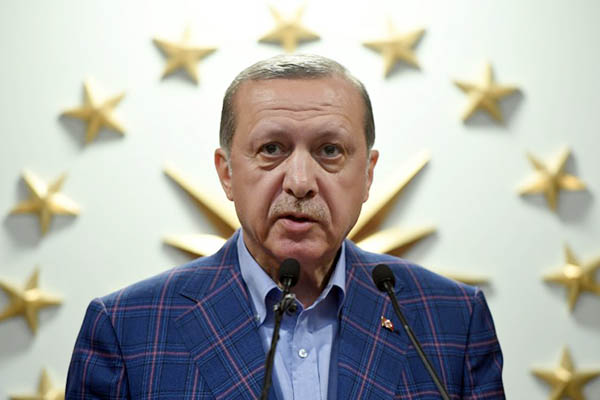
Bulent Kilic—AFP
Turkey’s Erdogan has much to gain—and lose—in Syria following U.S. exit from the region
A U.S. withdrawal in northern Syria opens the way for a long-threatened operation by Turkey against Kurdish forces, but Ankara faces major risks if it goes ahead.
For a year, President Recep Tayyip Erdogan has said Turkey would launch an operation east of the Euphrates against the Kurdish People’s Protection Units (YPG) militia, a group supported and protected by Washington but viewed by Ankara as terrorists. With the White House announcing late on Sunday that Turkey would soon launch the operation, and American troops withdrawing from key border areas, Erdogan faces no obstacles but many risks.
What does Turkey want?
Turkey wants a “safe zone” in northern Syria—30 kilometers deep and 480 kilometers wide—that would push the YPG away from its border. It says the buffer zone would also allow for the return of some of the 3.6 million Syrian refugees currently in Turkey, where anti-refugee sentiment is growing.
The YPG spearheaded the fight on the ground against the Islamic State (I.S.) group as part of the Syrian Democratic Forces, with the support of the U.S.-led international coalition. But Ankara says the YPG is a “terrorist” offshoot of the outlawed Kurdistan Workers’ Party (PKK), which has waged a bloody insurgency against the Turkish state since 1984.
A victory for Erdogan?
Since Erdogan has long pushed for the “safe zone,” the U.S. move is “absolutely” a victory for him, said Steven Cook, a senior fellow at the Council on Foreign Relations. “Erdogan has been working tirelessly to convince [U.S. President Donald] Trump that the U.S. should leave Syria so that Turkey can prosecute the fight against the YPG and resettle Syrians,” he said.
The White House decision came after a phone call between Trump and Erdogan, demonstrating the Turkish leader’s ability to convince his American counterpart despite resistance within the U.S. administration. “By giving the green light to Turkey to intervene, the United States has given the impression of having ‘capitulated’ with Turkish demands,” said Jana Jabbour, a Turkish foreign policy expert at Sciences Po in Paris. “This in itself is a diplomatic victory for Erdogan,” she told AFP.
Challenges ahead?
Turkey has launched two military operations supporting Syrian opposition fighters—in northern Syria against I.S. in 2016 and against the YPG in 2018. But a question remains over Turkey’s ability in the air.
During the offensive against the Kurdish enclave of Afrin in early 2018, Ankara needed Russia’s permission for Turkish planes to take off. The latest plan is much bigger in scope—and more expensive.
“A new Syria operation will generate economic costs, and it is not certain that in the context of the current recession in Turkey the country has the means for such an operation,” Jabbour said. She also pointed to growing skepticism among the Turkish public towards Ankara’s involvement in the “Syrian chaos.”
“This is why Ankara would have preferred an agreement with the United States for the establishment of the safe zone on the border, a scenario which would have allowed Turkey to share the burden with Washington,” Jabbour said.
How to manage I.S.?
Turkey has another burden, as the White House said Ankara would now be responsible for I.S. fighters captured over the past two years and held in Kurdish detention centers.
Trump, who has frequently urged European governments to repatriate jihadists from their countries, has now pushed the problem onto Turkey. Erdogan said on Monday that Washington and Ankara would work on the issue together but he did not elaborate on the form of the eventual cooperation.
“Now Turkey has to confront I.S., which shows every indication of trying to regroup and threaten the countries in the area,” Cook said. However, Erdogan’s spokesman insisted in a tweet on Monday that Turkey “will not allow [I.S.] to return in any shape and form.”
